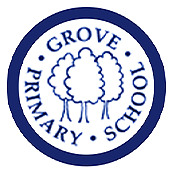Curriculum Intent & Impact Statement
Here at Grove Primary School we provide a broad and balanced curriculum delivering outstanding learning opportunities for children.
Our curriculum is a creative and thematic approach to learning that is mapped to the 2014 primary National Curriculum to ensure comprehensive coverage of national expectations. Underpinning our curriculum are 10 'Big Ideas': Humankind, Processes, Creativity, Investigation, Materials, Nature, Place & Space, Comparison, Significance and Change. These aspects allow children to make links across subjects and support children's long-term memory.
Topics are delivered through Imaginative Learning Projects and Knowledge Rich Projects, which provide a rich menu of exciting and motivating learning activities that make creative links between all aspects of children’s learning. We believe children learn better when they are encouraged to use their imagination and apply their learning to engaging contexts. Our curriculum provides many learning challenges throughout the academic year that require children to solve problems, apply themselves creatively and express their knowledge and understanding effectively. We have a rigorous skills and knowledge framework that outlines the end of year expectations in all subjects. These skills and knowledge are tied to activities and are age-related so that staff can track children’s progress and identify their individual learning needs.
.jpg)
Curriculum Impact Statement
At Grove Primary School we measure the impact of our curriculum in the following ways:
- Analysis of data and performance in statutory assessments (Reception Baselines, Year 1 Phonics Screening Check, Year 4 Multiplication Tables Check and KS2 SATs);
- Analysis of school performance at the end of each key stage compared with national and local data;
- Analysis of data and teacher assessment (Reading, Writing and Maths) every term;
- Analysis of end of unit teacher assessments for foundation subjects;
- Using a range of assessment and analysis strategies: moderation of work, pupil progress meetings, assessment and data tracking;
- RAG impact evaluation of the school development plan - Quality of Education (termly);
- RAG impact evaluation of subject action plans (termly);
- Termly curriculum update for governors;
- Annual reporting of standards across the curriculum (end of year reports/subject action plans/school development plan/self-evaluation form);
- Subject monitoring evidence each term (impact of monitoring statements);
- Through external curriculum reviews and audits, including subject deep dives (School improvement advisors and education consultants).
- Regular pupil voice exercises using evidence, when available, where pupils are challenged to recall their knowledge and discuss what they have been learning about in current, recent and previous learning;
- Work scrutiny - whole class/year group/phase/ whole school and smaller samples;
- Moderation of pupil work across the school and with other schools;
- Parental feedback: parents’ evenings, parent workshops, showcase evening, informal meetings and parent surveys;
- Through use of digital evidence (photographs/video footage) that captures pupil voice, pupil work, educational visits, curriculum workshops, class assemblies and competitions.

